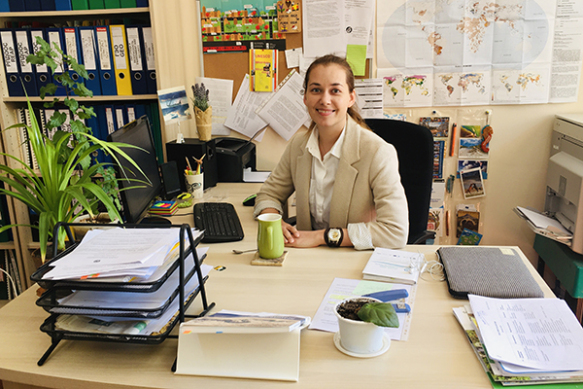
Nataliya Chemayeva at her desk at the Scientific-Information Center, Interstate Sustainable Development Commission, International Fund for Saving the Aral Sea.
Through The Rotary Foundation, we invest in emerging leaders who are using their skills to make the world a better place. We have the amazing opportunity in Rotary to participate in this work by offering scholarships that enable these young leaders to expand their skills and make connections with other professionals in their fields.
During Reconnect Week 5-11 October, we celebrate these alumni and hold activities designed to keep them connected. These alumni serve as ambassadors for Rotary, joining a growing network of peacebuilders and service-minded professionals who are partnering with us to do good in the world.

Rotary Scholar Bota Sharipova with her daughter.
Bota Sharipova of Kazakhstan and Nataliya Chemayeva of Turkmenistan are both recipients of a global grant scholarship from District 5340 to study at the Joint University Water Cooperation and Diplomacy Program. Since graduating from the program, they are continuing to use what they learned and the connections they have made to promote peace through water cooperation, working together on several initiatives involving six countries that share the Aral Sea Basin centered in Central Asia.
The Water Cooperation and Diplomacy Program is a collaboration between the IHE Delft Institute for Water Education in The Netherlands, the University for Peace in Costa Rica, and Oregon State University in Oregon, USA. It trains future water managers and other professionals how to address conflict over water by providing a comprehensive understanding of both water science and water diplomacy, including dispute mitigation, management, and resolution.
District 5340 has been providing global grant scholarships to water professional in six of the countries that share the Aral Sea Basin. Access to water and conflict resolution are closely intertwined in Central Asia. Former water management policies have left the Aral Sea, once the fourth largest lake in the world, a fraction of its size and contaminated by high salinity. It has lost 90 percent of its area in just 30 years, with dramatic consequences for health, local economies, and the environment. All this has exacerbated tensions between the countries that share this vital resource.
Bota and Nataliya, two of the initial seven scholars, have been working together since completing the program to develop an online tool that will allow countries in the Aral Sea region and beyond to use the Blue Peace Index to assess cooperation in managing shared water resources.
Bota reports:
“We have simplified the original methodology and made it usable by young water scientists to calculate the index themselves. … We have the support of the International Secretariat for Water through the end of the year to develop a few video pieces, instruction files, and working papers which will be translated into Russian, English, Spanish, and French. All these would be placed on the web page of the World Youth Parliament for Water with a link also to the global website of the Blue Peace movement.”
Additionally, Nataliya reports:
“We organized a WaterCafé group on Facebook as a part of our capacity building activity in the region, where we have been sharing some interesting water insights and promoting it as the platform for young water professionals. Throughout these months the platform grew bigger, becoming a bit more popular, attracting up to 300 participants who have been reading/commenting/participating in our activities. We had our Rotary Scholar classmate Aminjon (Tajikistan) presenting his thesis and Elena (current Rotary Scholar from Uzbekistan) present a UNESCO report.”
To date, the district has awarded 14 global grant scholarships to the Water Cooperation and Diplomacy Program to young professionals from countries sharing the Aral Sea Basin. A second cohort of students from Afghanistan, Uzbekistan, Kyrgyzstan and Tajikistan are in the third leg of their program taking online classes from Oregon State University while residing in the Netherlands due to COVID-19 related travel restrictions. A third cohort will commence their studies in the fall of 2021.
 The goal is for these scholars and others in the future to stay connected through their professional and Rotary contacts to advance water cooperation and diplomacy throughout Central Asia and its neighboring countries. Get more information about Water Cooperation and Diplomacy Program scholarships
The goal is for these scholars and others in the future to stay connected through their professional and Rotary contacts to advance water cooperation and diplomacy throughout Central Asia and its neighboring countries. Get more information about Water Cooperation and Diplomacy Program scholarships
https://blog.rotary.org/2020/10/07/rotary-scholars-stay-connected-through-water-diplomacy/
